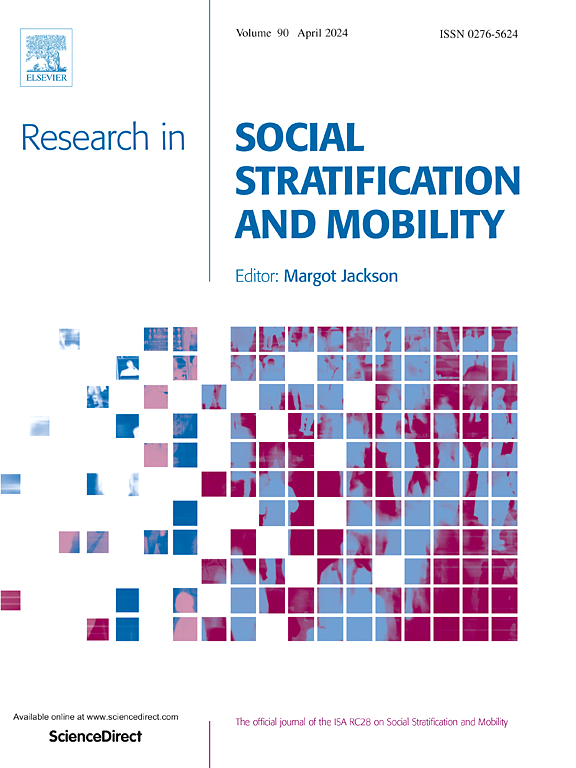亚裔美国移民子女的父母背景教育与教育流动性
IF 2.7
1区 社会学
Q1 SOCIOLOGY
引用次数: 0
摘要
相对于美国出生的个人和来自他们原籍国的人,许多亚裔美国移民在教育方面都非常挑剔。后一种形式的选择性——情境教育——在最近的分层研究中引起了人们的兴趣。背景教育是亚裔美国人平均受教育程度高的原因之一。然而,研究还没有评估父母背景教育在亚裔美国人高教育流动性中的作用——父母和后代教育之间的弱关联。利用国家教育纵向研究和Barro-Lee教育成就数据集的关联数据集,本研究扩展了背景教育对亚裔美国人教育成果的作用的知识。与先前的研究一致,分析发现,相对于后来的白人受访者,中国和韩国移民子女的平均教育水平较高,父母的背景教育占了一部分。父母背景教育也是中韩移民子女亲子教育联系薄弱的一部分原因。这些结果表明,背景教育可能在部分亚裔美国移民群体的高教育流动性中发挥了小到中等的作用。本文章由计算机程序翻译,如有差异,请以英文原文为准。
Parental contextual education and educational mobility among the children of Asian American immigrants
Many Asian American immigrant populations are highly selective in education relative to both US-born individuals and those from their country of origin. The latter form of selectivity—contextual education—has gained interest in recent stratification research. Contextual education accounts for a portion of Asian Americans’ high average educational attainment. However, research has not evaluated parental contextual education’s role in Asian Americans’ high educational mobility—the weak association between parental and offspring education. Drawing on a linked dataset of the National Education Longitudinal Study and the Barro-Lee Educational Attainment Dataset, this study extends knowledge of contextual education’s role for Asian Americans’ education outcomes. Consistent with prior research, the analysis finds that parental contextual education accounts for a portion of the Chinese and Korean children of immigrants’ higher average education levels relative to later generation White respondents. Parental contextual education also accounts for a portion of the weak parent-offspring education association among Chinese and Korean children of immigrants. These results suggest that contextual education may play a small-to-moderate role in the high educational mobility among some Asian American immigrant populations.
求助全文
通过发布文献求助,成功后即可免费获取论文全文。
去求助
来源期刊
CiteScore
7.80
自引率
6.00%
发文量
46
期刊介绍:
The study of social inequality is and has been one of the central preoccupations of social scientists. Research in Social Stratification and Mobility is dedicated to publishing the highest, most innovative research on issues of social inequality from a broad diversity of theoretical and methodological perspectives. The journal is also dedicated to cutting edge summaries of prior research and fruitful exchanges that will stimulate future research on issues of social inequality. The study of social inequality is and has been one of the central preoccupations of social scientists.

 求助内容:
求助内容: 应助结果提醒方式:
应助结果提醒方式:


